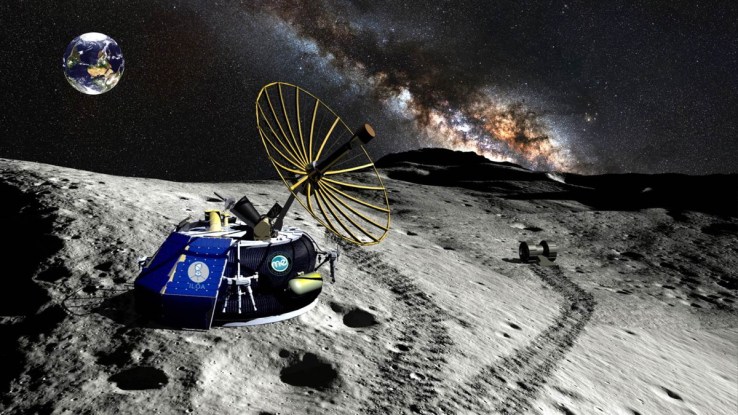
Moon Express has officially become the first private company in the world to receive permission to travel beyond Earth’s orbit. After months of conversations with government officials, the company received the green light from the FAA to venture to the moon in 2017.
“We are now free to set sail as explorers to Earth’s eighth continent, the moon, seeking new knowledge and resources to expand Earth’s economic sphere for the benefit of all humanity,” said Bob Richards, co-founder and CEO of Moon Express.
The announcement marks an important milestone for private companies in the space industry because, so far, all commercial space activities have been limited to operations within Earth’s orbit.
Moon Express was born out of the Google Lunar X-PRIZE, an international contest with $30 million up for grabs for a private company who can soft-land on the moon and travel across its surface.
If successful, Moon Express will become the fourth entity in history to soft-land on the moon. The first three were all superpowers — the U.S., USSR and China – while Moon Express is privately funded and comprises 26 entrepreneurs and engineers.
It’s important to note that the permission given to Moon Express doesn’t necessarily set a precedent for other companies. Naveen Jain, co-founder of Moon Express, told TechCrunch that this permission is a one-time exception for their company. Jain stated the U.S. government plans to take future requests to travel beyond Earth’s orbit on a case-by-case basis until laws governing this activity can be passed.

Interestingly, the legalities surrounding a private mission to the moon came about a bit backwards.
First, Moon Express purchased a launch to the moon with Rocket Lab in October 2015. At that time, they didn’t have permission from the government to go to the moon or the regulatory security that they could have ownership of lunar resources they obtained if theycould get there.
Then, in November 2015, the Commercial Space Launch Competitiveness Act was passed, which explicitly stated that private companies are allowed full ownership of resources they extract in space. The bill made it legal for Moon Express to mine the moon and keep what they extracted, but they still didn’t have permission to travel to the moon in the first place.
This was the last piece of the regulatory puzzle, but from a security point of view, giving this permission to anyone with the resources to go is a bit tricky.
For example, national assets like reconnaissance satellites that monitor specific areas of the Earth are located over 20,000 miles away in geosynchronous orbit (GEO). This is the farthest orbit that private companies have placed satellites in to date. Going beyond this orbit could potentially give a company full view of some of the most important space-based security satellites, making it important for the government to know exactly what a company intends to do on a mission past GEO.
for receiving permission to do so. Jain explained that representatives from multiple federal agencies, including the State Department and the NSA worked together to determine that the FAA, which is already responsible for granting launch licenses to rocket companies, should be the official point of contact for this type of activity.
On April 8th, 2016, Moon Express submitted an application for a 2017 commercial lunar mission to the FAA and has since received approval to move forward with its plans.
“This simply shows that every company can achieve their moon-shot,” said Jain.
The company will launch to the moon in the second half of 2017 on a rocket provided byRocket Lab. Jain stated that Moon Express’ first mission, which is a one-way trip, is expected to be profitable due to private payloads and sponsorships. The company also fully expects NASA to participate by sending a paid scientific payload, although their business plan is not dependent on it.
Once on the surface, Moon Express hopes to win further X-PRIZE awards by moving across the surface. Instead of roving, they will re-fire their rockets on the MX-1 lander and “hop” to different locations.
When asked if they expect to beat other frontrunners in the competition, Jain focused instead on their future plans, saying “We don’t start a company to win a prize. Winning the Google Lunar X-PRIZE would just be the icing on the cake. We choose to go to the moon because it’s good business.”
In the future, the company expects to make money by harvesting resources on the Moon, like water and Helium-3, creating a fuel depot on the surface and eventually performing round-trip missions with the capability of bringing payloads back to the Earth. By the end of the year, Moon Express plans to double their employee base to over 50 people.
Jain told TechCrunch that he believes this is just the beginning of private companies’ presence in deep space and that the way people will make money in space is only limited by our imagination. Likening it to how the iPhone’s App Store enabled the creation of a diverse set of apps from companies all over the world, Jain said “We just don’t know what the Pokemon Go or the Snapchat of the space industry is yet.”
Now that Moon Express has received official permission to move forward with its plans, we can expect other U.S. companies with similar lunar aspirations, like Astrobotic, to follow suit in the near future.
It’s been nearly a decade since the Google Lunar X-PRIZE was announced and now most of the regulatory pieces are finally falling into place. Eventually, space-faring nations will need to put a plan in place to streamline private ventures beyond Earth’s orbit. For now, we’ll have to watch exploration progress one company at a time.

 Popular
Popular Tags
Tags Videos
Videos
0 comments:
Post a Comment